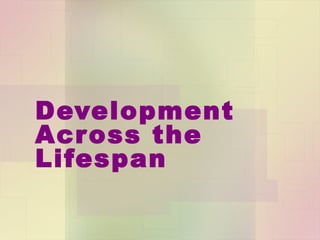
Psychology Chapter 9, Development
- 2. Chapter in Perspective • Lifespan Developmental Psychology – The branch of psychology concerned with the changes in psychological functioning that occur, from conception across the entire life span. • From conception until death, we change – Physically – Cognitively – Psychosocially
- 3. Basic Issues In Developmental Psychology • Which is more important to human development? • Nature – Genetics • Nurture – Environment in which we are raised.
- 4. Basic Issues In Developmental Psychology • Behavior Genetics – Relatively new field – Combines • Psychology • Biology – Researchers work on the nature-or-nurture question.
- 5. Nature vs Nurture • Why does a child misbehave? – Inherited tendency to be active? • Nature – The way the parents raised him? • Nurture • Most psychologists believe both nature & nurture shape our behavior. – Critical question • How much does nature or nurture determine behavior?
- 6. Psychosocial Development In Childhood • 3 temperament types in young children have been identified: 1. Easy 2. Slow-to-warm-up 3. Difficult
- 7. Temperament • Heredity – Important in determining temperament • Environment – Mother’s child-rearing attitudes can influence adolescent temperament. • MOM’S FAULT
- 8. Psychosocial Development In Childhood • Sigmund Freud – Personality develops as a child deals with conflicts between • Biological urges • Demands of society • Erik Erikson – Psychosocial crises, or conflicts between • Psychological needs • Societal demands – Main determinants of personality
- 9. Psychosocial Development In Childhood • Erikson's psychosocial crises for childhood include: – Basic trust versus basic mistrust (birth to age 1.5 years), – Autonomy versus shame and doubt (1.5 to 3 years), – Initiative versus quilt (3 to 7 years), and – Industry versus inferiority (7 to 10 years).
- 10. Harry & Marguerite Harlow • Attachment • Intense reciprocal relationship occurring between two people, usually a child and an adult. • Studies of young monkeys conducted by Harry and Marguerite Harlow – Attachment was determined by contact comfort, rather than by the presence of food.
- 11. Harry & Marguerite Harlow • Determined raising baby monkeys in isolation in laboratory – Detrimental effect on social behavior • A major conclusion of Harlow's research – Attachment was important • Did not ensure normal social development. – Environmental contact (nurture) • With members of one’s own species is needed for this kind of development.
- 12. Cognitive Development In Childhood • Changes that occur in our thought processes throughout life. – Piaget • Cognitive development progresses through a series of qualitative stages
- 13. Cognitive Development In Childhood • Jean Piaget – 50 years observing children’s intellectual functioning. – Cognitive development progresses through a series of stages. – All children progress through these stages in same sequence.
- 14. Sensorimotor Stage • Sensorimotor stage – Birth to age 2 • Infants learn to coordinate their senses and their motor behavior. • Organize world into: – What can I put in my mouth – What is graspable – What makes noise • What they experience directly
- 15. Sensorimotor Stage • Object permanence – Perception that objects continue to exist even when out of sight. – Baby’s favorite game? • Why?
- 16. Sensorimotor Stage • Self-recognition – Towards end of stage – Rouge test Lewis & Brooks 1979 – Placed in front of mirror – Touched nose at 18 – 24 months.
- 17. Preoperational Stage • Ages 2 to 7 – Able to use mental representations & language to describe, remember & reason about the world, though only an egocentric fashion. • Mental representations – See object in head • Egocentrism – Can’t see things from another person's point of view.
- 18. Preoperational Stage • Animistic Thinking – Imagining that inanimate objects have life & mental processes. • Child tripped over coffee table, what will they say? • Fantasy Play – Believe they are Batman • Symbolic Gestures – Stick becomes a gun
- 19. Cognitive Development In Childhood • Piaget demonstrated that preoperational children do not grasp the principle of conservation, the understanding that a change in the size or shape of a substance does not change the amount of that substance.
- 20. Concrete Operational • Ages 7 - 11 • Able to: – Represent objects mentally – Begin to use logical reasoning about the world • Not able to: – Think abstractly • What would happen if we had no thumbs?
- 21. Formal Operational • Adolescence to adulthood • Able to think abstractly – Think in terms of possibilities as opposed to concrete reality.
- 22. Adolescence • In U.S. society, no single event marks the passage from childhood to adulthood. • Children experience an extended period of adolescence, which lasts roughly from age 12 to age 20. – Not expected to work
- 23. Adolescence • Thought & behavior continues to be somewhat childish &contradictory. • Personal fable – One is not subject to the same rules as other people. – Unique – Invulnerable
- 24. Adolescence • Imaginary audience – Assumption that everyone else is concerned with his or her appearance and behavior.
- 25. End